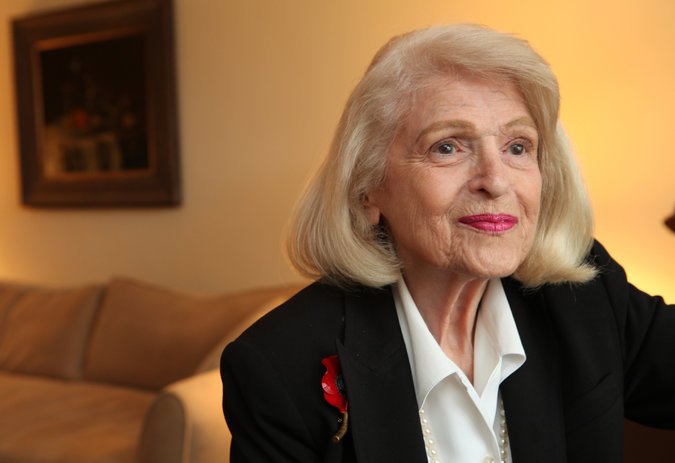Edith Windsor, whose same-sex marriage fight led to landmark ruling, dies at 88

Edith Windsor died on Tuesday in Manhattan. She was 88. Her wife, Judith Kasen-Windsor, confirmed the death, at a hospital, but did not specify a cause. They were married in 2016.
via NY Times
Four decades after the Stonewall Inn uprising fueled the fight for LGBT rights in America, Ms. Windsor, the widow of a woman with whom she had lived much of her life, became the lead plaintiff in what is widely regarded as the second most important Supreme Court ruling in the national battle over same-sex marriage rights.
Ms. Windsor had originally gone to court simply to obtain a tax refund. But for thousands struggling for gender equality, the stakes went far beyond tax advantages available to married heterosexuals, including Social Security, health care and veterans’ benefits; protection in immigration and bankruptcy cases; and keeping a home after a spouse had died, as well as food stamps, green cards and federal aid to the poor, the elderly and children.
After living together for 40 years, Ms. Windsor and Thea Spyer, a psychologist, were legally married in Canada in 2007. Dr. Spyer died in 2009, and Ms. Windsor inherited her estate. But the Internal Revenue Service denied her the unlimited spousal exemption from federal estate taxes available to married heterosexuals, and she had to pay taxes of $363,053.
She sued, claiming that the law, by recognizing only marriages between a man and a woman, unconstitutionally singled out same-sex marriage partners for “differential treatment.”
Affirming two lower court rulings, the Supreme Court, in the United States v. Windsor, overturned the law in a 5-4 ruling. It cited the Fifth Amendment guarantee that no person shall be “deprived of life, liberty or property without due process of law.”
The Defense of Marriage Act had been adopted in Congress by wide margins and signed by President Bill Clinton under the pressures of an election year, at a time when gay marriage was illegal across the country and odious to millions of Americans.
By striking down the act’s definition of marriage as a union of a man and a woman, the Supreme Court invalidated the entire law and for the first time granted same-sex marriage partners the recognition and benefits accorded married heterosexuals.
But there was a catch. The decision did not say if there was a constitutional right to same-sex unions, and it left in place laws in 37 states that banned such marriages. As a practical matter, that meant the benefits would not extend to couples in states that did not allow same-sex unions, but only to those in 13 states and the District of Columbia, all of which recognized them.
Gay-rights advocates acknowledged that the ruling had fallen short of their hopes for a constitutional guarantee of nationwide marriage equality. But it was, they said, a crucial step.
President Barack Obama called an elated Ms. Windsor with his congratulations. She became a national celebrity, a gay-rights matriarch, a grand marshal of New York City’s LGBT Pride March and a runner-up to Pope Francis for Time magazine’s person of the year in 2013.

